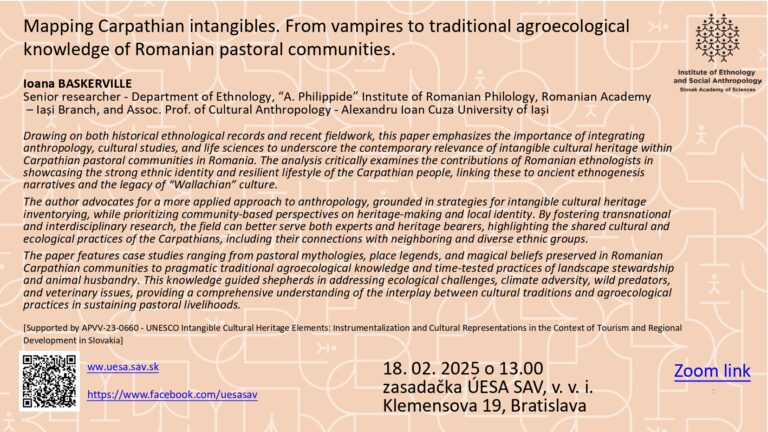Mapping Carpathian intangibles. From vampires to traditional agroecological knowledge of Romanian pastoral communities
- 18.2.2025

V mene Vedeckej rady Ústavu etnológie a sociálnej antropológie SAV, v.v.i. Vás pozývame na odborný seminár, kde vystúpi Ioana Baskerville pôsobiaca na Department of Ethnology, “A. Philippide” Institute of Romanian Philology, Romanian Academy – Iași Branch a Alexandru Ioan Cuza University of Iași, s príspevkom v angličtine s názvom Mapping Carpathian intangibles. From vampires to traditional agroecological knowledge of Romanian pastoral communities.
Odborný seminár bude konať v utorok 18. februára 2025 o 13.00 hod v zasadačke ÚESA SAV, v. v. i. na Klemensovej 19 v Bratislave. Podujatia je možné zúčastniť sa aj online prostredníctvom aplikácie Zoom: https://us06web.zoom.us/j/87568249755?pwd=wFGtTPSWcJrAZAjThNSDibHSHsDch1.1
Anotácia prednášky:
Drawing on both historical ethnological records and recent fieldwork, this paper emphasizes the importance of integrating anthropology, cultural studies, and life sciences to underscore the contemporary relevance of intangible cultural heritage within Carpathian pastoral communities in Romania. The analysis critically examines the contributions of Romanian ethnologists in showcasing the strong ethnic identity and resilient lifestyle of the Carpathian people, linking these to ancient ethnogenesis narratives and the legacy of “Wallachian” culture.
The author advocates for a more applied approach to anthropology, grounded in strategies for intangible cultural heritage inventorying, while prioritizing community-based perspectives on heritage-making and local identity. By fostering transnational and interdisciplinary research, the field can better serve both experts and heritage bearers, highlighting the shared cultural and ecological practices of the Carpathians, including their connections with neighboring and diverse ethnic groups.
The paper features case studies ranging from pastoral mythologies, place legends, and magical beliefs preserved in Romanian Carpathian communities to pragmatic traditional agroecological knowledge and time-tested practices of landscape stewardship and animal husbandry. This knowledge guided shepherds in addressing ecological challenges, climate adversity, wild predators, and veterinary issues, providing a comprehensive understanding of the interplay between cultural traditions and agroecological practices in sustaining pastoral livelihoods.
Odborný seminár sa uskutočňuje v rámci projektu APVV-23-0660 Prvky nehmotného kultúrneho dedičstva UNESCO: Inštrumentalizácia a kultúrne reprezentácie v kontexte turizmu a regionálneho rozvoja na Slovensku, ktorého nositeľom je Ústav manažmentu kultúry a turizmu, kulturológie a etnológie, Filozofická fakulta, Univerzita Konštantína Filozofa v Nitre a ÚESA SAV, v. v. i. spoluriešiteľským pracoviskom.